AgriGo4Cities - Survey
11-07-2018
AgriGo4cities Questionnaire
In the scope, the Agrigo4cities project a community garden was set up in the Arany János EGYMI, which is a school for children with special needs in Székesfehérvár. The garden – expression of urban and peri-urban agriculture as a tool to reach the main three aims of the projects: to integrate participatory approach into decision-making processes, to increase socio-economic inclusion of vulnerable/marginalized groups and to promote sustainable urban development. The students were involved in the planning and building of the garden and the monitoring is partly based on their opinion. To measure the opinions and feelings about the garden we used a brief questionnaire.
The questionnaire was targeted at a group of 25 mild intellectually disabled students. It was short and simple with the aim to catch their attention without boring them. The results will be analyzed as follow:
- Features of the target group (gender, age, and type of education)
- Evaluation of different activities
- Opinions about the pilot action
- Activities in the garden and something about the process after the garden was established
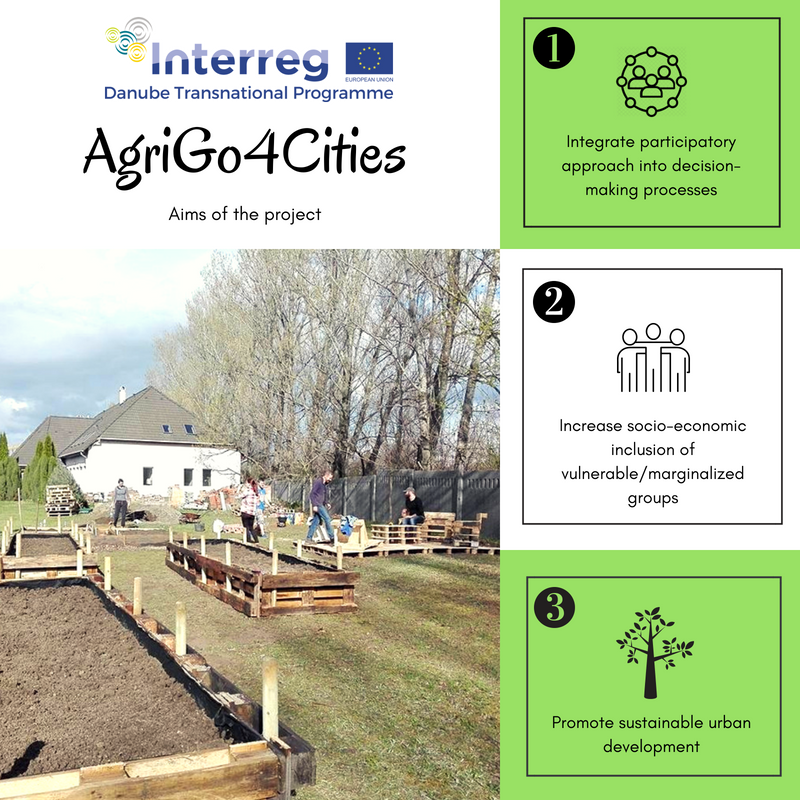
1. Features of the target group (gender, age, and type of education)
The questionnaire was given to 25 students, but only 23 gave the feedback. Among the students who answered the questionnaire, there were 13 females and 10 males, and the range of their age is between 16 and 23 years, the average was 17.6. The students were asked about the type of education: 6 of them, attend the gardener course, 11 of them attend the florist one, 2 of them the kitchen staff course and 5 students answered that they attend another course, among them, 3 attend joiner courses. As the questionnaires show most of the students are involved in gardening courses that could foster their interest in the project.

2. Evaluation of different activities
By considering their status as a vulnerable group and how hard could be to catch their attention the result was quite successful. The students were asked to express a value between 1 and 5 (the worst and the best) for the following activities which were done in the project:
- Filling out the questionnaire
- Planning the garden
- Visiting the community garden in Palotaváros
- Building the garden
- Opening day
What emerged from the data is that students mostly considered planning and building of the garden as the best activities. The 1st figure shows that there is not a big gap between the averages of the values, the rage is between 4 and 5 that means the students were interested in the whole process. Despite this, some considerations can be done. Filling the evaluation questionnaire was the activity that received lowest score 4.00 when the students were asked to fill the first questionnaire about community gardening they were not so excited or not even paid so much attention. Conversely, they were very cooperative and happy during the planning which average is 5.00. During the prototyping workshop, students were involved through an interactive method that perfectly fit the needs and skills of the target group, it could catch their attention.
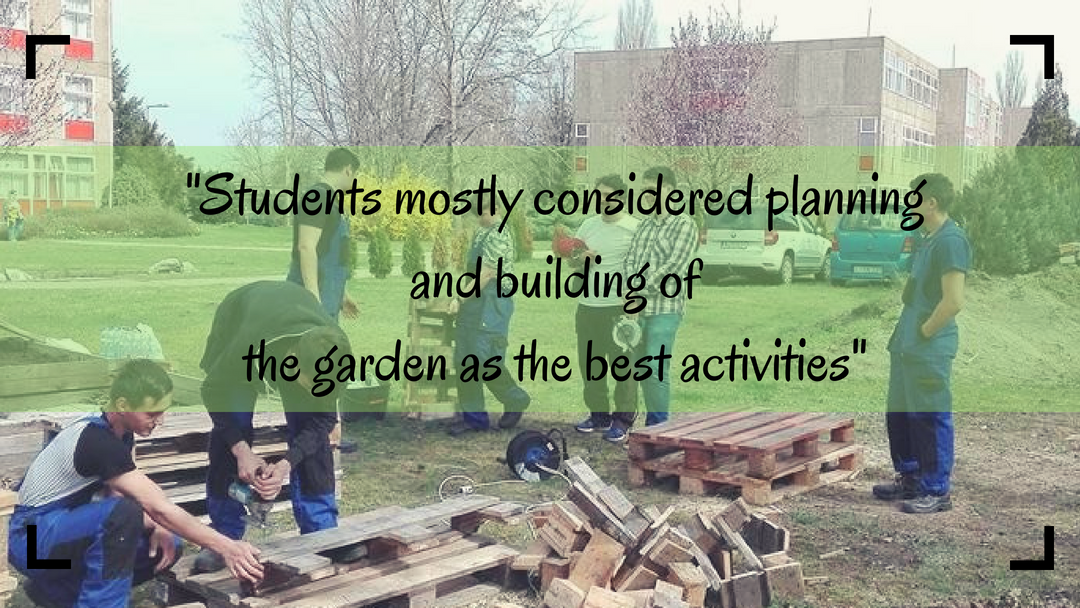
Furthermore, building the garden was considered by them one of the best activity with average is 4.94. Briefly, the planning and the building were the activities they liked more probably because they could be entirely involved in the process, they had the opportunity to share ideas by preparing the prototypes and then work with their hands to create the community garden, namely the activities through which they could more express themselves.
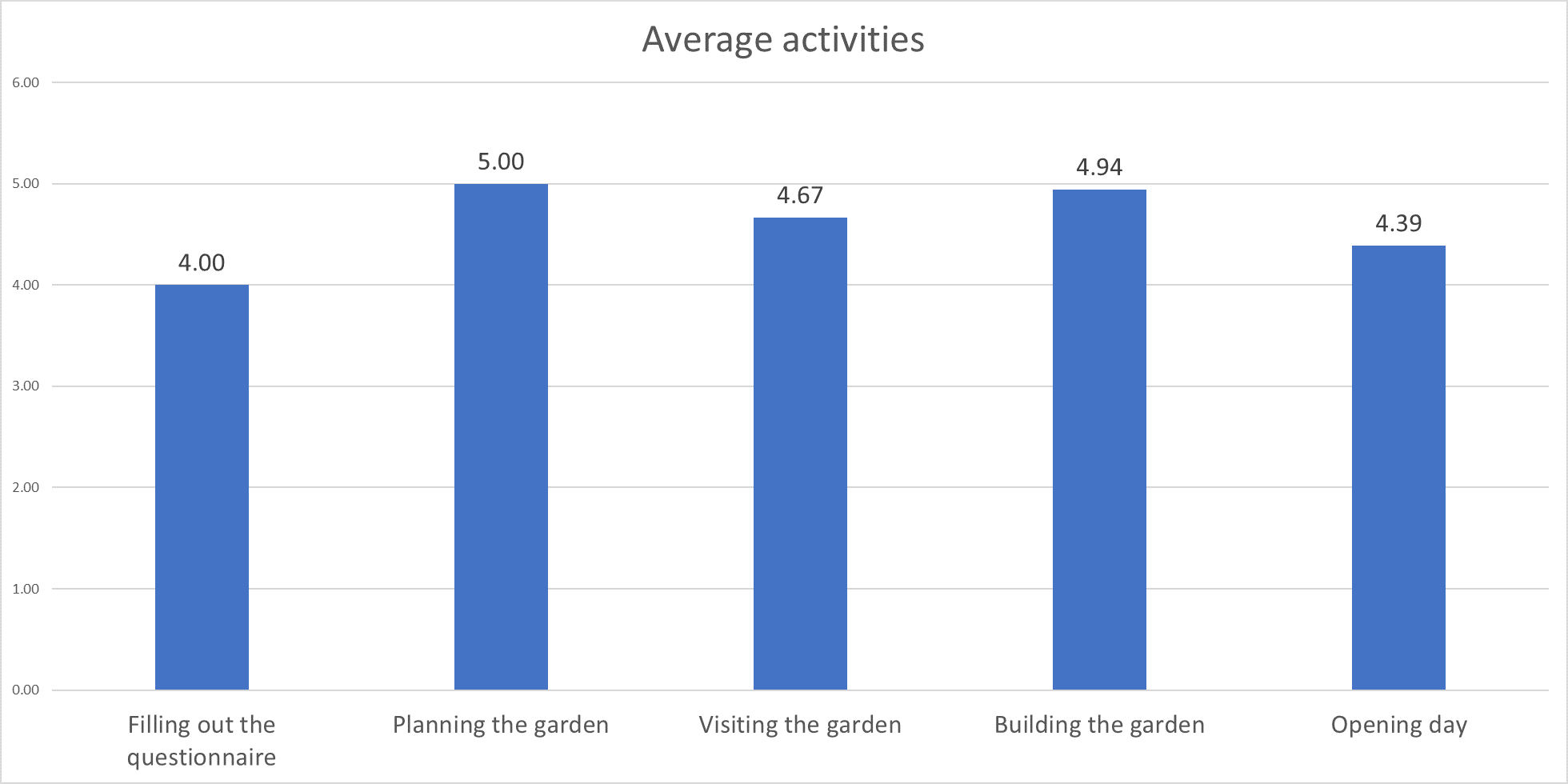
1st Figure
3. Opinions about the pilot action
The questionnaire included some statements about what the students felt, namely opinions and attitudes by answering:
- totally not true
- not true
- true
- totally true
As the 2nd figure shows the rage of the average is between 3.04 and 3.43. the highest averages refer to the following statements:
- Because I participated in the planning of the garden I feel it belongs to me more than if I had just received it (2)
- Because of the garden (planning, building, classes there) I developed myself from the professional point of view (10)
The successful result is linked to the planning and the method that we used. The students affirmed that the participation in the planning gets them more closely to the garden itself. The participation allowed them to develop some knowledge about participatory planning and bottom-up approach and skills about gardening and because of that, they feel they have improved themselves from the professional point of view.
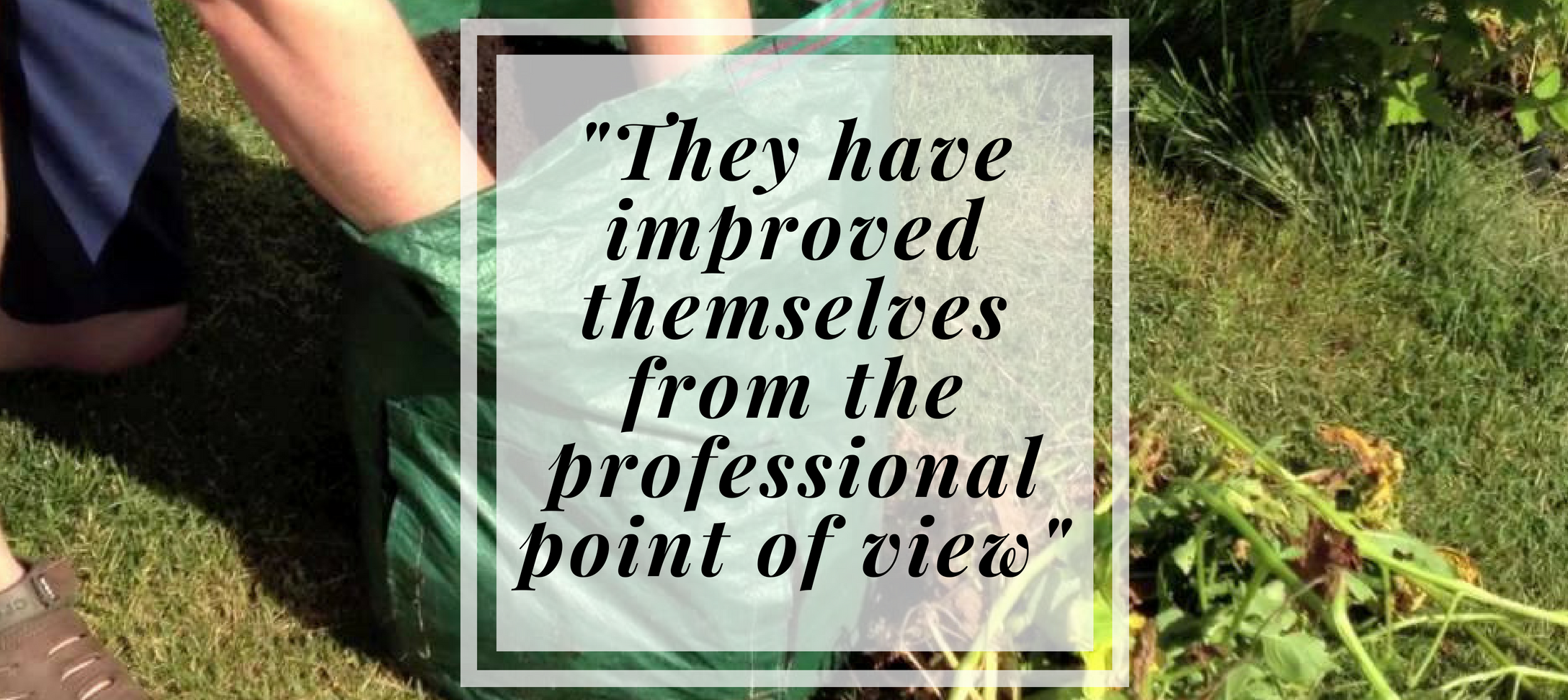
As the 2nd figure shows the students are more agree and consider true that the participatory planning can produce more successful results in terms of social inclusion. They felt the garden belongs to them because of their intensive participation in the prototyping. They liked the method used (5), namely drawing the prototypes and the average in the chart 3.22 shows that the answer true was the most chosen and not totally true, maybe some improvements could be done about the method. For example, not just drawing the prototypes but creating miniature gardens with soil and seeds could be more interesting for them.
Moreover, as the chart shows they felt the garden belongs to them also because of the building of it (3). The feedback was positive about deep feelings such as be proud of the participation in planning (6) and in the building (7) the garden or to be more self- confident (9). Finally, they imagine participating in similar planning process in the future, even in their neigneighborhood with 3.17 average could be consider a successful result. It can be interpreted positively, the community garden process left them the idea about planning process to use in the future, that means they appreciated and they are still curious an interested to spread it in their neighbourhood.
"They felt the garden belongs to them because of their intensive participation in the prototyping"
The lowest averages refer to the following statements respectively with 3.04 and 3.09:
- I feel that during the planning I could express my thoughts (1)
- I already believed in the garden when it was just an idea (4)
Probably, that means that the students could not express themselves as they wanted and have more time or space to talk about their thoughts. Furthermore, during the planning of the garden when they prepared their own prototypes some students preferred to work alone. The method of drawing increased their interest and willing more than filling out a questionnaire but anyway working team skills could be improved and encouraging them to cooperate more. As the averages show not all the students believed in the garden when it was just an idea, probably because of a lack of trust in social topic and public institutions.
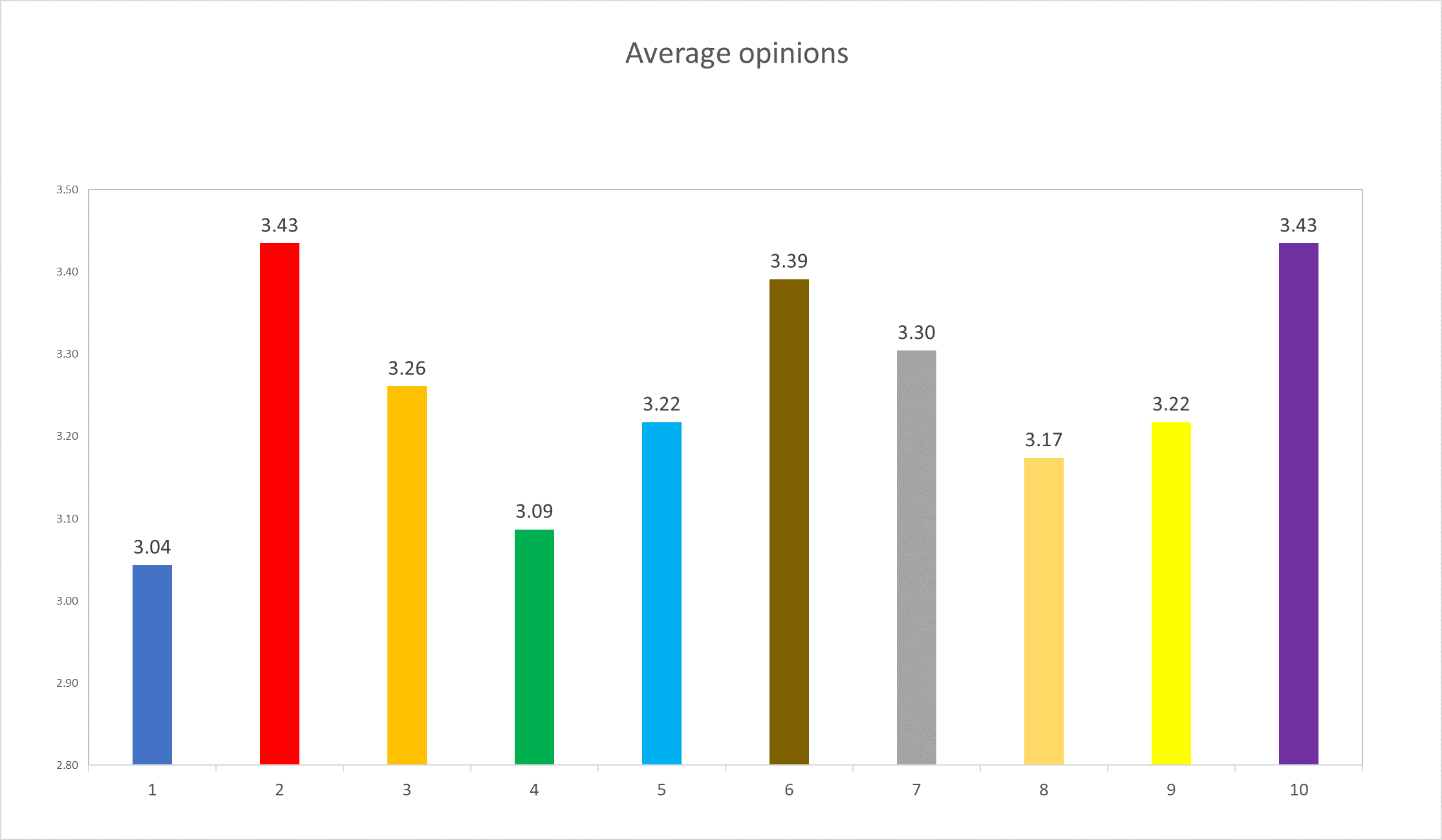
2nd Figure
- I feel that during the planning I could express my thoughts
- Because I participated in the planning of the garden I feel it belongs to me more than if I had just received it
- Because I participated in the building of the garden I feel it belongs to me more than if I had just received it
- I already believed in the garden when it was just an idea
- I liked the method that we use during the planning
- I am proud of my participation in the planning of the garden
- I am proud of my participation in the building of the garden
- I can imagine participating in similar planning process in the future, even in my neighborhood
- I feel that my personality developed during the building of the garden (I can express myself better, I gained self-confidence)
- Because of the garden (planning, building, classes there), I developed myself from the professional point of view
4. Activities in the garden and something about the process after the garden was established
The questionnaire shows all the 25 students visited the garden and there is quite sharing about the main activities carried out. The activities were as following:
- planting the seeds,
- digging,
- clearing sagebrush,
- watering,
- hoe work,
- checked the growing plants.
From the questionnaire emerged that the main activities mentioned are more related to the educational goal of the garden without express some activities more related to the community meaning of the garden. They did not recognize other activities such as using the community space for creative activities (e.g. open-air classes) worthy to be mentioned. Finally, the students wrote some suggestions about the community garden the majority suggests more raised beds and higher quality of soil.

